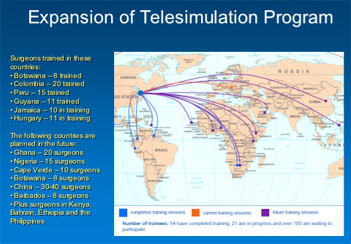Our Department's Global Footprint
In a stirring annual report on the status of the Department
of Surgery, Richard Reznick surveyed the remarkable
accomplishments of the faculty, residents and staff
despite tightening fiscal constraints and the imminent
political and pandemic plagues.

The Department of Surgery's Global Footprint
|
Ori Rotstein introduced St. Michael's Hospital's new
CEO Robert Howard who reported progress on communication
among our affiliated hospitals as "the LHINs are
sorting out, though the boundaries are not intuitive, and
largely unknown to patients". He drew attention to the
advantages of the Ontario choice to retain hospital boards,
preserving institutional memory, tacit knowledge and fundraising
opportunities, in contrast to regionalization moves
in other provinces. He predicted that the monthly TAHSN
(Toronto Academic Health Science Network) meetings will
make the LHIN system more effective. Robert Howard
succeeds the able Jeff Lozon who has finished his term at St.
Michael's. He brings to his new position years of experience
as a clinician, researcher and educator in cardiology. He
has served as Chief Medical Officer and Executive Vice-
President, Programs and Education at St. Michael's.
Richard thanked the excellent, largely unsung work of Robin
Richards and his promotions committee, who reviewed
and promoted to Full Professor Christopher Caldarone
(Cardiac Surgery, Hospital for Sick Children), Gail Darling
(Thoracic Surgery, University Health Network), Peter
Dirks (Neurosurgery, HSC), Andras Kapus (Research, St.
Michael's Hospital), Peter Kim (General Surgery, HSC),
Ronald Levine (Plastic Surgery, St. Joseph's Health Centre),
James Mahoney (Plastic
Surgery, SMH), Sydney
Radomski (Urology,
UHN), Carol Swallow
(General Surgery,
Mount Sinai Hospital),
and Douglas Wooster
(Vascular Surgery,
UHN). Gideon Cohen
(Cardiac Surgery,
Sunnybrook Health
Sciences Centre), Marc
De Perrot (Thoracic
Surgery, UHN), Annie
Fecteau (General
Surgery, HSC), Ted
Gerstle (General Surgery,
HSC), Raja Rampersaud (Orthopaedic Surgery, UHN),
Paul Wales (General Surgery, HSC), and Frances
Wright (General Surgery, Sunnybrook) were promoted to
Associate Professor. (see Spring 2009 Awards)
|
Vice chair Ben Alman reported that there are 33 surgical
residents in the Surgeon-Scientist program, of whom 84%
have external support. The remainder are supported by the
generous contributions of surgical alumni. The Surgeon-
Scientist program will celebrate its 25th anniversary on
May 6, 2010. Its global impact and the translation of its
research into significant changes in patient care include
targeted chemotherapy for colon cancer, perfidex preservation
solution for lung transplantation, passive motion
to ensure flexibility following healing of fractures through
joint surfaces, warm cardioplegia, and stem cell treatment
in a wide variety of applications. Allan Okrainec presented
his internet teaching of minimal access surgery throughout
the world. (see Winter 2009 article about Allan Okrainec)

Expansion of Telesimulation Program to teach Minimal Access Surgery
|
Richard Reznick highlighted four important new programs
developed during the past year.
- The collaborative bariatric surgical program which
will serve 900 patients per year in six hospitals. (see Spring 2009 Chair's Column).
- The restructure of the
training of surgeons to
competency-based curricula.
The first version
of the new program
has been introduced
in orthopaedic surgery.
The program is based
on 21 modules in which
knowledge and skill is
the constant rather than
time. $1.7 million has
been granted by the
province to develop and
evaluate the program.
- The spine program
(see Winter 2008 article).
- The checklist program (see Winter 2009 article).
"I cannot recall a clinical care innovation in the past 30
years that has shown results of the magnitude demonstrated
by the surgical checklist. This is a change ready
right now for adoption by every hospital that performs
surgery." Donald Berwick, IHI.
The meeting closed with a moving presentation by surgical
oncology fellow Kurt Weiss, an orthopaedic oncologist
(see related story in this issue "Learning About Sarcoma"). There are 209 fellows from 59 countries in the department
this year.
M.M.
|